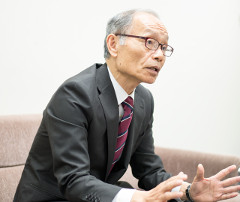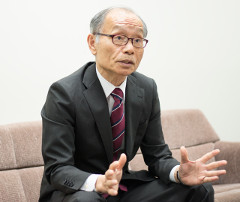Reason why the understanding of civilian control is not advanced

Many people may have heard the term Civilian Control. It is a system in which civilians, who play an essential role in democracy, aim to control and manage military organizations. Most of you may think that you are aware of that. So how does civilian control function in practice in Japan? What makes civilian control necessary? There actually seem to be few people who understand that clearly. Why is it? There are a few reasons for this. I believe this is because Japanese citizens do not distinctly regard the Self-Defense Forces (SDF) as a military organization in the first place. The biggest reason we support the SDF that first comes to mind is that they play an active role in disaster relief. Since their role in direct hostilities is strictly restricted even when they are sent to the world’s conflict areas, we cannot help but consider that we cannot put them on the same level with foreign militaries. It is also undeniable that we have long seen the SDF as an extension of the police, such as the National Police Reserve, the predecessor of the SDF.
Further, what makes this conclusive is that the Japanese postwar constitution stipulates any organization of force that can be said to have war potential is renounced. However, in the Korean War, which began on June 25, 1950, the Eighth United States Army, which was stationed in Japan, made a sortie to the Korean Peninsula. At this time, Japan started to rearm, setting aside the contents of its pacifist constitution, due partly to the request of Emperor Showa and others who were alarmed at security in Japan. At first the new organization was called the National Police Reserve, which consisted of 75,000 personnel including members of the former army and navy as commanders. Then after the National Safety Forces, the Self-Defense Forces were established in July 1954.
Basically, the SDF, including its predecessors, were not established at the request of Japanese citizens, but established practically on the instruction of the United States. The U.S. Army was born as a citizens’ military to fight the War of Independence, and the People’s Liberation Army of China was also born based on the people (citizens), as its name suggests. In both democracies and socialist states, military organizations have been placed at the center of the nation and society in history, whether originating from civilians or the military. In this sense, the understanding of and support for the SDF are never steadfast, perhaps due to the origin of this organization of force.
Consequently, civilian control has been introduced so that the SDF, which have actually become the seventh largest organization of force in the world, will not go out of control like the prewar military and intervene in politics and bring about a war. Civilian control is a system that has been created for pacifism and democracy, which has become the principle of postwar Japan, and it should not be destroyed by militarism. In other words, civilian control exists to protect pacifism and democracy. In the system to control the SDF, multiple layers of control, including control by the Diet, control by the Cabinet, and control by the budget, are supposed to be activated. The term “civilian control” is used as a collective term for these multiple layers of control. An organization of force (military) needs to be controlled with such effort because there have been a number of coups in history, in which the military always intervenes in politics to take over. Prewar Japan had a bad experience in which democracy was destroyed by the military, which resulted in facing an age of wars. In this sense, civilian control was absolutely born from the lessons of history.
Collapsed Civil Official Control, the Japanese way of civilian control
In this discussion, I have argued that the term Civilian Supremacy is more precise than Civilian Control, which is a confusing expression. It is the concept that militarism must give absolute obedience to democracy without discussion in order to ensure the idea that democracy predominates over militarism. This is because freedom, autonomy and self-reliance (as the basic principles of democracy), and mobilization, control and management (as the basic principles of militarism) mix like oil and water. They never blend. At least after the war, the Japanese pledged to create a society on the basis of democracy to rebuild a nation that could develop credibility and gain respect in the international community. From this perspective, we had to refrain from sympathy for the philosophy of militarism. Therefore, in order to maintain the minimum organization of force as the Self-Defense Forces for national defense in the international community, which has remained strict, the civilian control system must function so as to avoid harming democracy. In order to protect democracy, we must avoid disturbing the function of civilian control. I have been working on the issues of civilian control for years in order to nurture strong democracy.
Some nations maintain large numbers of military personnel, such as China (2.34 million persons), the United States (1.4 million), India (1.33 million) and Russia (0.7 million). On the other hand, having been freed from the threat of the former Soviet Union, advanced countries in Europe, such as France (210 thousand), Germany (180 thousand) and the United Kingdom (150 thousand) are earnestly working on troop cuts (disarmament). Unlike them, Japan currently maintains 250 thousand SDF personnel. On the grounds of the threat of China and North Korea, both the number of SDF personnel and the defense budget have been on the rise. At the same time, the SDF organizations have been given more authority.
Meanwhile, I believe that in democratic Japan, we have little fear that the SDF organizations will intervene in politics in a coup or any other attempts like the prewar military did. However, considering today’s move to specify the Self-Defense Forces in the Constitution and some other attempts, I realize that civilian control must fully function. Even though the current SDF would not make a disturbing move imprudently, the SDF used to cause incidents that were failed coups, such as the SanmuSanyu Incident (1961), Mitsuya Incident (1963) and Mishima Incident (1970). None of the three incidents, which strangely enough all have the Chinese character meaning “three” as the first character, were led by the SDF organizations. However, active high-ranking military officers of the SDF were involved in the Mitsuya Incident in the year before the Tokyo Olympics (1964), which posed a big shock to citizens. It was planned by some troops within the SDF to besiege the Diet in order to put pressure on the Diet to pass the prewar version of the National General Mobilization Act, assuming the outbreak of the second Korean War. That reminded us of the May 15 Incident (1932) and the February 26 Incident (1936), which both occurred before the war.
As a matter of fact, I was a student of the School of Arts and Letters of Meiji University, and was on the Ochanomizu Campus when the Mishima Incident occurred. It occurred at the Eastern Army Headquarters of the Japan Ground Self Defense Force (the prewar location of Army Ministry and the current location of the Ministry of Defense) near Ichigaya Station. The Tatenokai group led by Yukio Mishima, who was a globally famous author, delivered an address to encourage the SDF to attempt a coup with the goal of establishing a nation under imperial rule, and then Mishima committed suicide by harakiri. I vividly remember the deep shock I felt from the Incident as if it was yesterday. It was this Incident that made me have an interest in history of coups d’états, and political and military history. It feels like I have been thinking since then about effective ways for democracy to control military organizations. Although this may be a strange way to put it, what I suspected then was that weakened civilian control may have caused Mishima, an excellent world-class author, to commit suicide by harakiri. I would like to think that, if civilian control had fully functioned and there had been few people in the SDF who had made a commitment to Mishima’s militarism, he would not have called on the SDF to take action. In fact, there were quite a few SDF personnel and relevant players who made a commitment to Mishima.
In my opinion, the situation is running out of control in today’s Japan. The purpose of the revision of the Act for Establishment of the Ministry of Defense (Article 12) passed in September 2015 was to place the Minister’s Secretariat and Director-Generals (civilians or “suits”), and Chiefs of Staff (military personnel or “uniforms”) on the same level as assistants of the Minister of Defense. Principally, Chiefs of Staff were positioned under the Minister’s Secretariat and Director-Generals, which was said to be the foundation of civilian control in Japan. There is no article on civilian control in the Japanese constitution or laws. It is because, as already stated, the Constitution of Japan declares that no war potential will be maintained, that no military organization is envisioned. I suppose this is another reason Japanese citizens pay less attention to civilian control. Instead, the fact is that defense bureaucrats have exercised control. In other words, it had been “civil official control” instead of civilian control. However even this has collapsed.
Mature democracy as the foundation to create peaceful society

Most Japanese citizens, however, have the predominant opinion that it is essential to enhance the SDF as a strong defense force unless the military expansion of China and the threat of North Korea are resolved. Although military tension in the East Asian region is indeed on the decrease with the inter-Korean summit and the US-North Korea summit, a simple theory that a defense is required has been established, one which suggests that with the minimum defense, “preparation is prevention.” However, the citizens pay too little attention to the reality that Japan’s strong defense gives a sense of menace to the neighboring Asian nations, including North Korea. Moreover, since even a defense force can be transformed into military strength capable of invasion, defense and offense are currently indistinguishable from each other. The Japanese armament scheme in particular is called a foreign campaign type, obviously maintaining great military strength capable of certain overseas operations. Japan already holds three de facto aircraft carriers, which is military common sense in the world community. The Japan Maritime Self-Defense Force calls them large transport vessels. Although they are not, as a matter of course, huge genuine aircraft carriers of 100,000 tons like the U.S. Navy has, they are light aircraft carriers with spacious flight decks on which anti-sub helicopters can be used. They are not appropriate equipment for the SDF, which has an exclusively defense-oriented policy.
Today, China’s naval expansion is also an issue in which many Japanese people have a deep interest. In my opinion, it can be presumed that China is pursuing naval expansion to set up military bases and to establish a “maritime Great Wall” to block an invasion by the United States or other countries, just like past Chinese dynasties tried to block an invasion of the northern people with the Great Wall. China is busy setting up a defense line so that its history of constant invasion by foreign powers is never repeated. I also presume that, through this expansion, the Communist Party of China seeks to secure the legitimacy to rule its 1.4 billion people. In addition, North Korea has no capability or intention to invade Japan, and China has no benefit at all in invading the faraway United States or nearby Japan. Why should we take such issues as threats and go for military expansion? We should never fall for political propaganda.
After all, we need to change our attitude of trying to compete against military superpowers such as China and the United States with military power. I believe that Japan should first make efforts to create a peaceful community in Asia with a force of peace based on its pacifist constitution instead of having a military force. Military power guarantees the profit structure of military expansion, but it never guarantees a peaceful society. We, the Japanese, must have learned this from the history leading up to the Second World War. In these circumstances, strengthening the functions of civilian control in any case to firmly protect democracy is certainly going to result in protecting peace.
* The information contained herein is current as of July 2018.
* The contents of articles on Meiji.net are based on the personal ideas and opinions of the author and do not indicate the official opinion of Meiji University.
Information noted in the articles and videos, such as positions and affiliations, are current at the time of production.

